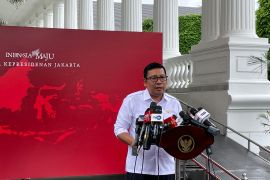"With regard to the exchange rate, we can just monitor the balance of trade. If a trade deficit occurs, how can the rupiah appreciate," BI Governor Agus Martowardojo said.Jakarta (ANTARA News) - Bank Indonesia Governor Agus Martowardojo said the current account deficit in April had caused fluctuations in the countrys currency and made it difficult for the rupiah to strengthen.
"With regard to the exchange rate, we can just monitor the balance of trade. If a trade deficit occurs, how can the rupiah appreciate," he said here on Thursday.
He said extra efforts must be taken so that exports will increase again and improve the rupiahs exchange rate.
"Non-oil/gas exports did increase, but minerals exports have dropped. Our imports are also large," he said.
He added that global economic conditions must also be followed, such as the slow growth in China which is one of the countrys biggest export destinations.
"The slow growth in China also affects Indonesias economy," he said.
According to the National Statistics Agency (BPS), Indonesias trade balance in April was at a deficit of US$1.96 billion after a surplus of US$0.67 billion in the previous month.
The trade performance was affected by trade in non-oil/gas that turned into a deficit in April after a surplus in the prior month, although the oil/gas trade balance was lower than in March.
The oil/gas trade balance was at a deficit of US$0.89 billion compared to a surplus of US$2.02 billion in March, due to a contraction of exports by 7.09 percent and that of non-oil/gas imports grew 19.32 percent month-to-month.
The negative growth of non-oil/gas exports, especially for commodities, such as coal and vegetable oil, was in line with a weaker demand from China and India.
On the other hand, manufacturing exports, such as machinery/mechanical equipment, non-knitted garment and footwear, grew. Meanwhile, the hike in imports was driven by increasing imports of nine of ten primary goods, such as mechanical equipment and machinery, electrical machinery and equipment and iron steel.
The oil/gas trade balance was also at a deficit in April, although it was down to US$1.07 billion from US$1.35 billion in March.
The narrowing deficit in the oil/gas trade was caused by deeper contraction in oil/gas imports or by 7.55 percent, due a drop in the imports of oil products by 0.5 percent and crude oil by 24.78 percent, while exports of oil and gas only declined 0.35 percent month-to-month given a decrease in crude oil exports.
According to Bank Indonesia, the trade deficit in April was still in line with the seasonal pattern, including increasing demand before the Islamic fasting month and the post-fasting holiday.
The condition is expected to improve again, following increasing export activities in line with an improving global economy.
"We are still convinced the deficit in the year 2014 can be contained below three percent of the GDP," Agus said.(*)
Editor: Heru Purwanto
Copyright © ANTARA 2014











